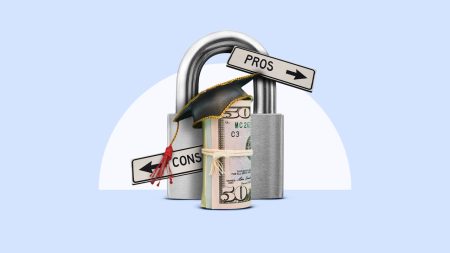EmirMemedovski/Getty Images
Key takeaways
- Mortgage brokers act as go-betweens for homebuyers and lenders, matching borrowers with financing providers.
- Brokers can find and offer borrowers various options, including unconventional loans and loans from banks that don’t directly work with the public.
- It’s important to interview brokers and understand their specialties and how they’re compensated.
A mortgage broker acts on your behalf to help you find the best deal. They facilitate the loan application process and serve as experts to ensure the loan closes on time. Their experience can be valuable, especially if you’re a first-time homebuyer, own a business or have atypical income.
What is a mortgage broker?
A mortgage broker is a go-between for borrowers and lenders that acts in the borrower’s best interest. If you’re buying a home or refinancing, a broker can help you find the best mortgage for your needs, as well as answer any questions you have.
They work with everyone involved in the lending process, including real estate agents, underwriters and closing agents. This collaboration ensures a borrower gets the best loan that closes on time. Mortgage loan brokers also pull the buyer’s credit reports, verify their income and expenses and organize the loan paperwork. Many brokers can access a powerful loan-cost system that prices a mortgage across multiple lenders at once, thereby streamlining the process.
“A mortgage broker not only helps you get the most competitive rates and pricing, they also help make sure your loan is a good match with the particular lender,” says Andrew Weinberg, principal at Silver Fin Capital Group in Great Neck, New York. “They can quickly determine the best lender for each individual borrower.”
Mortgage broker vs. lender vs. loan officer
- Mortgage broker
-
A mortgage broker matches borrowers with potential lenders and loans. Brokers partner with a variety of lenders, including commercial banks, credit unions, mortgage companies and other financial institutions, and can work independently or with a brokerage firm.
- Mortgage lender
-
A mortgage lender is the party responsible for providing the funds to the borrower to purchase a home.
- Loan officer
-
A loan officer is employed by a bank, credit union or other lender and is limited to providing the loan products their employer offers. Generally, loan officers act as the liaison between the institution and the individual borrowers: assessing them, providing guidance with the application and answering questions. Sometimes the terms refer to someone who either authorizes or recommends approval for loans, though technically that’s the underwriter’s job.
Brokers and lenders “offer” loans — but in different ways. A mortgage broker doesn’t originate or fund mortgages; only lenders actually provide the money. Instead, the broker is more like a mortgage advisor or counselor, showing the client various options, and then works with the chosen lender on the borrower’s behalf to get the loan approved, closed and funded.
A mortgage broker and a loan officer are similar in that they both help the borrower apply for a mortgage. But while brokers are independent entities who can work with a variety of lenders, loan officers work directly for a particular mortgage lender. A loan officer is the borrower’s primary point of contact if they use a bank, credit union or traditional lender to get a mortgage.
How do mortgage brokers work?
Mortgage brokers have a fiduciary duty to the borrower, meaning they are legally obligated to act in the borrower’s best interest (not their own or a lender’s). Below is a breakdown of what you can expect a mortgage broker to do. They:
- Act as agents for borrowers: Mortgage brokers work on behalf of borrowers to find them the best mortgage for their situation.
- Have access to more lenders: They work with a wide range of lenders, including those that operate only on a “wholesale” basis and don’t deal directly with the public.
- Handle multiple applications: Brokers do the legwork of submitting mortgage applications to various lenders on your behalf.
- Help you avoid extra costs: They can help you avoid lenders with hidden fees or unfavorable terms.
Note that brokers do charge a fee that they’ll collect when the loan closes. Either you or the lender will pay it. Working with a broker does not guarantee that you’ll get a better deal than if you decide to go without one.
Mortgage brokers are also subject to federal regulation. The Consumer Financial Protection Bureau (CFPB) plays a key role in enforcing rules that protect borrowers, especially under the Truth in Lending Act (TILA) and Real Estate Settlement Procedures Act (RESPA). These regulations help ensure that borrowers are treated fairly and offered transparency throughout the mortgage process.
How much does a mortgage broker cost?
“Most brokers do not charge the borrower anything at all in most scenarios,” says Weinberg. “The compensation paid to the broker by the lender does not add a penny to the borrower’s closing costs, just like the compensation paid by the big banks to their…loan originators doesn’t add to your closing costs.”
In the few instances when a broker charges the borrower for their services, borrowers can expect to pay a fee of 1 to 2 percent of the loan principal. Federal law caps broker fees at 3 percent and requires that they not be linked to a loan’s interest rate. Before you commit to working with a broker, ask about the fee structure and what you might be responsible for paying, if anything.
If you’re worried about fees and would like to avoid the extra expense, consider finding a lender on your own. You can do this by reading lender reviews and using mortgage rate comparison tools to find competitive options without a broker’s help.
Brokers don’t set rates — lenders do
Brokers work to find their clients the best mortgage deal they can, but ultimately, rates and fees are set by the lender. Annual percentage rates (APRs) vary from lender to lender and are impacted by your personal finances and macroeconomic factors. If you apply with a broker and are unable to secure the rate you want, it likely has more to do with your credit, financial situation or the economy than it does with the broker.
Why use a mortgage broker?
When deciding if a mortgage broker makes sense for you, consider the benefits and drawbacks of using one.
Pros of working with a mortgage broker
- You might save on fees. When you get a mortgage, you’re likely to pay an origination fee, application fee and appraisal fee — to name a few. A mortgage broker may be able to get the lender to waive some or all of those fees.
- You might save money on the loan itself. When it comes to the actual mortgage, brokers may be able to find a better deal than you could get for yourself. They have access to a broader mix of loans and lenders (including some you wouldn’t have access to as an individual). In particular, a mortgage broker can help you find the best mortgage rate in a rising interest rate environment.
- You can save time. Brokers do all the research on rates and fees. They negotiate for you, file the paperwork and keep the application process on track.
- You can avoid making a big mistake. Brokers can help you avoid common pitfalls with particular loans. They’ve read all the fine print and know the differences among lenders and the twists and turns in mortgages.
- You can find the right lender for tricky situations. If your credit history or financials aren’t great or the property you’re buying is unusual, a broker can find a lender who offers more lenient criteria or non-QM loans (untraditional mortgages) or who specializes in certain types of properties.
Cons of working with a mortgage broker
- Not all lenders work with mortgage brokers. Brokers may not have access to all loan programs at certain financial institutions.
- You might have to pay the broker. Usually, the lender pays the broker fee, but sometimes the borrower assumes the cost.
- There is potential for a conflict of interest. Brokers might favor lenders who pay them commissions, or the lenders who pay the largest commissions. It’s unlikely (not to mention unethical and illegal) that they’ll pressure you to sign with one place just because they’re compensated better. But, they might steer you away from, or not even tell you about, lenders not in their network.
- A broker’s estimate may be misleading. The loan estimate the lender must give you three days after your application may not dovetail with the initial breakdown the broker showed you. Based on your financials, the lender may charge a higher rate or fees, so that the cost of your loan comes out higher.
How to find a mortgage broker
Finding a mortgage broker requires some homework. Here are the steps you can take to make your choice:
- Research: Ask your real estate agent, friends and family for referrals. Read online reviews and check with the Better Business Bureau for complaints.
- Narrow it down to a few brokers: Consider their communication style, level of expertise and how they manage their clients’ needs.
- Interview the brokers: Ask plenty of questions and get a feel for how they work and whether they are knowledgeable about the sort of mortgage you’d qualify for.
- Speak with a former client: Ask them for a few references and make sure you speak with them directly.
Ultimately, it’s up to you to find the best mortgage provider, whether through a broker or loan officer, and to shop around for the best rate and lowest costs.
Questions to ask a mortgage broker
- How much do you charge, and who pays your fee? Broker fees can show up on the loan estimate or closing disclosure in several ways, so ask in advance to avoid surprises at closing.
- Which lenders do you work with? Most mortgage brokers have a stable of lenders they work with, and not all brokers work with the same lenders. Confirm the broker works with lenders offering the sort of mortgage products you’re interested in.
- How much experience do you have? As a rule of thumb, choose a mortgage broker who has been in the industry for at least three years. If you’re interested in a specific type of mortgage, ask how much experience the broker has with that kind of loan.
- Are you licensed to do business in my state? Confirm whether a mortgage broker is licensed through the Nationwide Mortgage Licensing System and Registry. They should also display their NMLS registration number on their website and in their email signature.
- Do you have references? Ideally, you have found your mortgage broker through a recommendation from a friend, relative or co-worker, but if not, it’s smart to check references.
- How do you handle rate locks? A rate lock guarantees you the interest rate you’re quoted for a certain amount of time, even if rates change. A typical rate lock lasts 30 days or 60 days. If the lender permits, you can add a “float down,” which guarantees you a lower rate if rates fall during your lock period.
Frequently asked questions
Why we ask for feedback
Your feedback helps us improve our content and services. It takes less than a minute to
complete.
Your responses are anonymous and will only be used for improving our website.
Help us improve our content
Read the full article here












